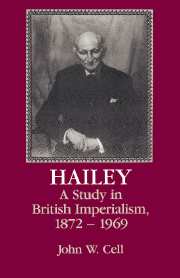Book contents
- Frontmatter
- Contents
- List of abbreviations
- Glossary of foreign words
- Preface
- 1 Early life
- 2 Colonization officer, 1901–1906
- 3 From Sargodha to Delhi, 1907–1912
- 4 Chief commissioner of Delhi, 1912–1918
- 5 A report on the Punjab
- 6 Finance member, 1919–1922
- 7 Home member, 1922–1924
- 8 Governor of the Punjab: the Sikhs, 1924–1925
- 9 Governor of the Punjab: the communal problem, 1924–1926
- 10 Governor of the Punjab: the communal problem, 1927–1928
- 11 Governor of the United Provinces, 1928–1930
- 12 Governor of the United Provinces: civil disobedience and Round Table Conference, 1930–1931
- 13 Governor of the United Provinces: 1931, year of crisis
- 14 Governor of the United Provinces: winding down, 1932–1934
- 15 Surveyor of Africa, 1935–1939
- 16 Two missions to Africa, 1939–1940
- 17 A report and a vision, 1941–1942
- 18 Adviser and propagandist, 1942–1945
- 19 Indian partition and the onset of African decolonization, 1945–1949
- 20 Defender of the faith, 1949–1969
- Bibliography
- Index
19 - Indian partition and the onset of African decolonization, 1945–1949
Published online by Cambridge University Press: 12 October 2009
- Frontmatter
- Contents
- List of abbreviations
- Glossary of foreign words
- Preface
- 1 Early life
- 2 Colonization officer, 1901–1906
- 3 From Sargodha to Delhi, 1907–1912
- 4 Chief commissioner of Delhi, 1912–1918
- 5 A report on the Punjab
- 6 Finance member, 1919–1922
- 7 Home member, 1922–1924
- 8 Governor of the Punjab: the Sikhs, 1924–1925
- 9 Governor of the Punjab: the communal problem, 1924–1926
- 10 Governor of the Punjab: the communal problem, 1927–1928
- 11 Governor of the United Provinces, 1928–1930
- 12 Governor of the United Provinces: civil disobedience and Round Table Conference, 1930–1931
- 13 Governor of the United Provinces: 1931, year of crisis
- 14 Governor of the United Provinces: winding down, 1932–1934
- 15 Surveyor of Africa, 1935–1939
- 16 Two missions to Africa, 1939–1940
- 17 A report and a vision, 1941–1942
- 18 Adviser and propagandist, 1942–1945
- 19 Indian partition and the onset of African decolonization, 1945–1949
- 20 Defender of the faith, 1949–1969
- Bibliography
- Index
Summary
In 1945 Lord Hailey was seventy-three, still vigorous, curious, and obsessively afraid of idleness. Under the Labour government his quasi-official role at the Colonial Office continued. His activities – including chair of the International African Institute and the association of retired Indian civil servants, Rhodes trustee, member of the governing body of the University of London's School of Oriental and African Studies – were numerous and he was a ubiquitous speaker. He remained passionately committed to the Commonwealth. and by that he meant not some ramshackle collection of countries having nothing in common except an agreement to convene periodic conferences, but something coherent, powerful, and British. The Commonwealth's mission in the world could be fulfilled only if it maintained its moral leadership, he declared, and that would be impaired if the organization included states either politically weak or economically backward. Small units should therefore be federated. Perhaps a United States of Africa?
The Romanes lectures of 1941 had of course said much the same thing. But there the discussion of compatibility and solidarity, of stature matching status, had been put in terms of the Commonwealth as a single, multiracial organization of free peoples in which colonies could aspire to full membership. Although he did not disavow that model, after the war the tone was different. Were African colonies really to have only internal self-government until a United States of Africa could be formed? Was independence therefore to be postponed more or less indefinitely?
- Type
- Chapter
- Information
- HaileyA Study in British Imperialism, 1872–1969, pp. 282 - 294Publisher: Cambridge University PressPrint publication year: 1992



